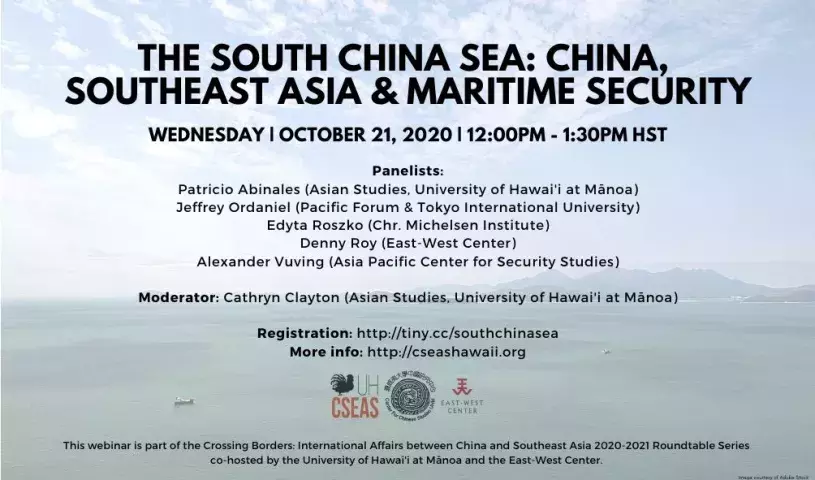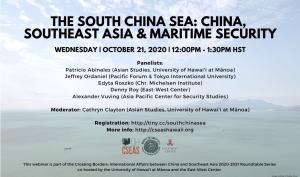Error message

The South China Sea is one of the most important strategic corridors in the world: it is a crucial shipping lane, lucrative fishing ground and home to huge gas and oil reserves. Most nations in the region -- China, Taiwan, Brunei, Cambodia, Indonesia, Malaysia, Myanmar, the Philippines, Singapore, Thailand and Vietnam – lay claim to at least part of this Sea, and in recent years China has been especially assertive about its claims to nearly all of it. Vietnam, the Philippines and Malaysia have challenged these claims, making it one of Asia’s most volatile hotspots for conflict.

- Patricio Abinales (Asian Studies, University of Hawai'i at Mānoa) is a professor at the Department of Asian Studies, College of Arts, Languages and Letters at UH Manoa. He teaches classes on Conflict in Southeast Asia; Food, Culture and Politics in Asia, Smuggling and the Illicit Sector in Asia, and Modern Philippine Politics. His current research is on politics and pestilence in the modern Philippines.
- Jeffrey Ordaniel (Pacific Forum and Tokyo International University) directs Maritime Programs at the Pacific Forum and serves as Assistant Professor of International Security Studies at Tokyo International University (TIU) in Japan. With a Ph.D. in International Relations, he studies maritime security and ocean governance, ASEAN regionalism, and broadly, US alliances and engagements in the Indo-Pacific.
- Edyta Roszko (Chr. Michelson Institute, Bergen, Norway) is an anthropologist with interest in maritime territorialization, militarization of oceans and seas, human security, markets and historical anthropology. She has just published her timely ethnography “Fishers, Monks and Cadres: Navigating State, Religion and the South China Sea in Central Vietnam" with NIAS Press.
- Denny Roy (East-West Center) is a Senior Fellow at the East-West Center. He was previously at the Asia-Pacific Center for Security Studies (also in Honolulu), the Naval Postgraduate School (Monterey, CA), and various academic positions in Singapore and Australia. Roy focuses on strategic and international security issues in the Asia-Pacific region.
- Alexander Vuving (Asia Pacific Center for Security Studies) is a Professor at the Daniel K. Inouye Asia-Pacific Center for Security Studies. His main areas of research include great power competition, Chinese strategy, Vietnamese politics and foreign relations, the South China Sea dispute, and history of human power. His most recent publications include an article titled “Will China Set Up an ADIZ in the South China Sea?” and an edited volume entitled “Hindsight, Insight, Foresight: Thinking about Security in the Indo-Pacific,” with his chapter on “Great Power Competition: Lessons from the Past, Implications for the Future.”
Moderated by: Cathryn Clayton (Asian Studies, University of Hawai'i at Mānoa)
For questions and more info, please contact:
Center for Southeast Asian Studies
email: cseas@hawaii.edu
web: cseashawaii.org
This webinar is a part of the Crossing Borders: International Affairs between China and Southeast Asia 2020-2021 Roundtable Series hosted by the Center for Southeast Asian Studies and Center for Chinese Studies at the University of Hawai'i at Mānoa, together with the Research Program of the East-West Center.
The South China Sea is one of the most important strategic corridors in the world: it is a crucial shipping lane, lucrative fishing ground and home to huge gas and oil reserves. Most nations in the region -- China, Taiwan, Brunei, Cambodia, Indonesia, Malaysia, Myanmar, the Philippines, Singapore, Thailand and Vietnam – lay claim to at least part of this Sea, and in recent years China has been especially assertive about its claims to nearly all of it. Vietnam, the Philippines and Malaysia have challenged these claims, making it one of Asia’s most volatile hotspots for conflict.

- Patricio Abinales (Asian Studies, University of Hawai'i at Mānoa) is a professor at the Department of Asian Studies, College of Arts, Languages and Letters at UH Manoa. He teaches classes on Conflict in Southeast Asia; Food, Culture and Politics in Asia, Smuggling and the Illicit Sector in Asia, and Modern Philippine Politics. His current research is on politics and pestilence in the modern Philippines.
- Jeffrey Ordaniel (Pacific Forum and Tokyo International University) directs Maritime Programs at the Pacific Forum and serves as Assistant Professor of International Security Studies at Tokyo International University (TIU) in Japan. With a Ph.D. in International Relations, he studies maritime security and ocean governance, ASEAN regionalism, and broadly, US alliances and engagements in the Indo-Pacific.
- Edyta Roszko (Chr. Michelson Institute, Bergen, Norway) is an anthropologist with interest in maritime territorialization, militarization of oceans and seas, human security, markets and historical anthropology. She has just published her timely ethnography “Fishers, Monks and Cadres: Navigating State, Religion and the South China Sea in Central Vietnam" with NIAS Press.
- Denny Roy (East-West Center) is a Senior Fellow at the East-West Center. He was previously at the Asia-Pacific Center for Security Studies (also in Honolulu), the Naval Postgraduate School (Monterey, CA), and various academic positions in Singapore and Australia. Roy focuses on strategic and international security issues in the Asia-Pacific region.
- Alexander Vuving (Asia Pacific Center for Security Studies) is a Professor at the Daniel K. Inouye Asia-Pacific Center for Security Studies. His main areas of research include great power competition, Chinese strategy, Vietnamese politics and foreign relations, the South China Sea dispute, and history of human power. His most recent publications include an article titled “Will China Set Up an ADIZ in the South China Sea?” and an edited volume entitled “Hindsight, Insight, Foresight: Thinking about Security in the Indo-Pacific,” with his chapter on “Great Power Competition: Lessons from the Past, Implications for the Future.”
Moderated by: Cathryn Clayton (Asian Studies, University of Hawai'i at Mānoa)
For questions and more info, please contact:
Center for Southeast Asian Studies
email: cseas@hawaii.edu
web: cseashawaii.org
This webinar is a part of the Crossing Borders: International Affairs between China and Southeast Asia 2020-2021 Roundtable Series hosted by the Center for Southeast Asian Studies and Center for Chinese Studies at the University of Hawai'i at Mānoa, together with the Research Program of the East-West Center.






